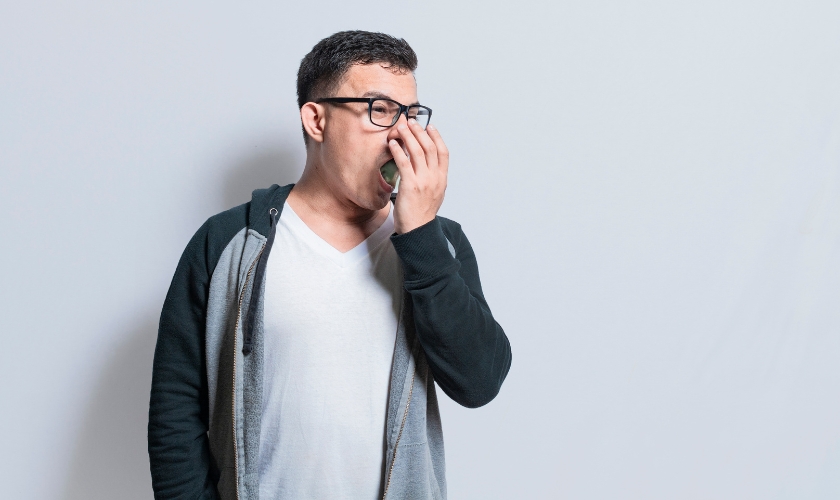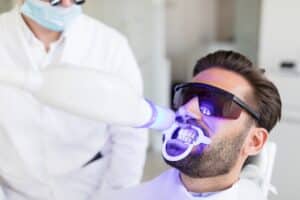Bad breath, also known as halitosis, is typically brought on by things you eat, harmful habits including smoking and alcohol consumption, infections in the mouth, and poor dental hygiene practices. Dry mouth, respiratory tract infections, systemic illnesses including diabetes, renal, liver, and lung disease, and gastrointestinal disorders like acid reflux and other stomach digesting troubles are some of the other factors.
What is halitosis?
Halitosis is an oral health issue characterized by the primary symptom of malodorous breath. Typically, the initial step in addressing this preventable condition involves identifying the root cause of the bad breath.
What causes bad breath?
Numerous factors contribute to bad breath, reflecting the abundance of bacteria present in the mouth. Halitosis can be attributed to the following causes:
Certain Foods
The consumption of specific foods, such as garlic and onions, can impact breath odor as these items are absorbed into the bloodstream, affecting breath until they are fully eliminated from the body.
Poor Oral Health Care
Inadequate brushing, flossing, and irregular dental check-ups allow food particles to linger in the mouth, becoming a breeding ground for bacteria. Accumulated food on the teeth, gums, and tongue can lead to decay, resulting in an unpleasant odor and taste.
Improper Denture Cleaning
Dentures that are not cleaned appropriately may harbor bacteria, fungi, and residual food particles, contributing to bad breath.
Bacteria on the Tongue
Certain bacteria located at the back of the tongue can interact with amino acids in foods, producing foul-smelling sulfur compounds.
Periodontal Disease
Bad-smelling breath and an unpleasant taste in the mouth are common symptoms of periodontal disease, necessitating immediate attention from an oral health professional.
Dry Mouth (Xerostomia)
Often integral to halitosis, dry mouth occurs when saliva production significantly decreases, hindering the mouth’s ability to self-cleanse and remove food debris. A dry mouth may result from specific medications, salivary gland disorders, or habitual mouth breathing instead of nasal breathing.
Tobacco products
Cigarettes, cigars, smokeless tobacco, and snuff are examples of tobacco products that discolor teeth and increase the body’s risk of certain ailments. But they also contribute to foul breath. Also, there is an increased risk for tobacco users for the following:
- Periodontal disease
- Loss of ability to taste
- Irritated gums
- Oral cancer
A health condition
Any of the following conditions can cause bad breath. Consult your physician for a diagnosis:
- A respiratory infection
- Infection of the nose, windpipe, or lungs
- Chronic bronchitis
- Postnasal drip
- Chronic sinusitis
- Diabetes
- A gastrointestinal disorder
- A liver or kidney disorder
What are the symptoms of halitosis?
The primary indicator of halitosis is the presence of a malodorous breath surpassing socially acceptable norms. This unpleasant odor may intensify, particularly in the morning or following activities like smoking, consuming coffee, or eating certain foods such as garlic.
How is halitosis diagnosed?
Dentists typically diagnose halitosis by considering the individual’s medical history and evaluating mouth odor during a comprehensive dental examination. The dentist conducts a thorough assessment of the entire oral cavity to identify potential causes, including infections. In cases where the dentist cannot determine the specific cause, they may refer the individual to a relevant specialist, such as Dr. Peter Truong Vo, a trusted dentist in Keller, TX, for additional investigation and evaluation.
What is the treatment for halitosis?
- If the cause of bad breath is linked to inadequate oral health care, the most common course of action is for your dentist to address the underlying issue as part of the treatment.
- If the root cause is gum disease, your dentist will likely initiate treatment or refer you to an oral specialist, typically a periodontist. Treatment may involve a periodontal cleaning to eliminate accumulated bacteria, tartar, or plaque causing inflammation along the gumline.
- If the cause of bad breath is extensive plaque buildup, your dentist or periodontist might suggest an antimicrobial mouth rinse. Additionally, you may receive guidance to gently brush your tongue during each tooth-brushing session, aiding in the removal of bacteria responsible for causing unpleasant odors.
- If the cause of bad breath is an underlying health condition, addressing and treating the diagnosed health issue may effectively eliminate the problem.
How can I prevent halitosis?
Halitosis can be prevented or minimized by adopting the following practices:
- Brush and floss your teeth a minimum of twice a day.
- Brush your tongue, cheeks, and the roof of your mouth, as a significant proportion of bad breath bacteria reside on the tongue. Thus, thorough tongue brushing or scraping can significantly improve breath freshness.
- If you wear dentures, remove them at night, thoroughly clean them before reinserting, and consult your dentist before using deodorizing sprays or tablets, as some may only provide temporary odor masking.
- If you smoke, consider quitting to not only achieve better-smelling breath but also promote overall health.
- Maintain saliva flow by consuming chewy, healthy foods like carrots and apples, which stimulate saliva production. Chewing sugar-free gum or sucking on sugar-free candies can also help. If dry mouth persists, your dentist may recommend artificial saliva.
- Schedule regular dental check-ups, as routine examinations can detect issues such as gum disease, infections, and dry mouth. If persistent bad breath remains unexplained, your dentist may refer you to your primary healthcare provider for further evaluation.
If you need any assistance with your dental health, visit your nearest dental clinic in Keller, TX. You should also remember that Dr. Peter Truong Vo, your trusted dentist in Keller, TX, is always there to assist you in case of any dental emergency. So, remember to book an appointment.





